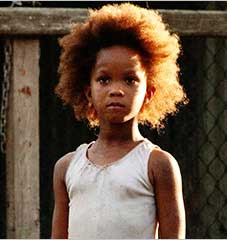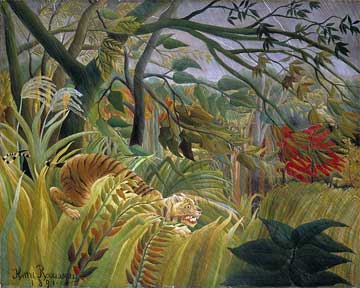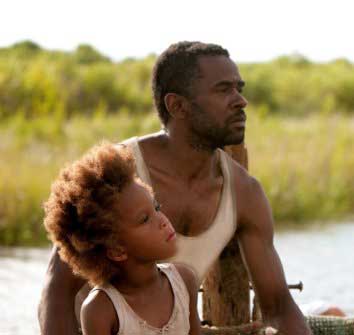Film (2012)
Directed by Benh Zeitlin
Written by Zeitlin and Lucy Alibar
from Lucy Alibar’s one-act play Juicy and Delicious.
Kendall Square Cinema
Cambridge, MA
With Quvenzhané Wallis (Hushpuppy), Dwight Henry (Wink), Jonshel Alexander (Joy Strong), Marilyn Barbarin (Cabaret singer), Kaliana Brower (T-Lou), Nicholas Clark (Sticks), Henry D. Coleman (Peter T), Levy Easterly (Jean Battiste), Philip B. Lawrence (Dr. Maloney)

Image: Mary Cybulski
The scene is The Bathtub, a perhaps mythical lowland wilderness area near levees in Louisiana, subject to extreme flooding.
Hushpuppy (Quvenzhané Wallis) and her father Wink (Dwight Henry) live in a hovel, or rather, independently, in a pair of hovels next to one another.
We watch Hushpuppy, oddly neglected, missing her long-lost mother and spoken to in harsh tones by her father, intentionally set her house on fire. Her father disappears due to illness and then returns in a hospital gown.
Soon there is a threat of a major storm which will flood the entire area. But Wink and a few other dissolutes insist on staying. After the storm, they are finally evacuated but Wink and Hushpuppy, along with a number of the other residents of The Bathtub, return.
Images of giant mythical wild boarlike creatures are interspersed throughout the film until they finally arrive and confront Hushpuppy who does not back down from them.
Wink’s illness gets worse. Hushpuppy and a bunch of the girls wind up being taken in by a floating brothel and the image of Hushpuppy’s lost mother reappears.

National Gallery, London
I can understand if this seems like a narrative jumble. Though compelling in some ways, this film is, quite intentionally, all over the place. But somehow through this depicted, and authorial, chaos, this rambling odyssey exhibits something about strength of character.
Hushpuppy is the omnipresent narrator, and we get a constant philosophical assessment, from her viewpoint, of how one comes to terms with a brutal world. Unpredicatably, through the utter confusion, violence, destruction and lack of any sort stable family life – perhaps by force of this inner narrative – this girl emerges in full force.
It is nice to think that this internal epic telling would be instrumental in the evolution of Hushpuppy’s strength of character. However, her observations about nature are sometimes unbelievable out of the mouth of a young child and it seems that the film might have done better to edit them way down, doing some reality testing along the way.
Her father, Wink, though often drunk, violent and absent, is determined to convey to his daughter how to survive in the wild. He wants her not to cry, but to fight and to survive. He teaches her how to catch catfish with her bare hands and how to ride out of a flooded attic on a raft. He is brutally raw in manner, but determined to help Hushpuppy endure.
In the end, despite those angrily applied restraints, Wink’s illness does lead to crying on both ends. It is odd to see after the anger and harshness that has preceded it, but moving nonetheless. Given that this film is a paean to tough love, that outcome is quite in keeping with the spirit of things.
Ultimately, the film poses some confusion about the source of Hushpuppy’s strength. Is it Wink’s brutally tough love or the power of Hushpuppy’s internal narrative that makes her resilient? One feels that, without that narrative, Hushpuppy might well have been crushed. With it, however, and with the strong sense of self the narrative cultivates, one can see how even the oddest and most confusing attempts at parenting, like Wink’s, can be positively assimilated.

Dwight Henry as Wink
This film wanders all over the place, from one disaster to another seemingly without end. A forced evacuation and brief sojourn in a shelter and hospital are but punctuations in this long march of troubles in an unkind wilderness. And the troubles are stacked like a bunch of cards, one after the other, without much rhyme or reason. They follow upon each other, but there is no real narrative logic to much of it. It is chaos in all senses: written, exhibited, and felt.
Perhaps it is only in the face of that chaos that Hushpuppy’s cohering narrative makes sense.
Images of the giant wild boars and the crashing of ice walls – presumably in polar regions as an indication of global warming and its effects on flooding of places like The Bathtub – give a preternatural feeling to the whole thing.
I was reminded, while watching these scenes, of Koyaanisqatsi: Life Out of Balance (1982), the cinematic epic-poem by Godfrey Reggio that combines cataclysmic images and a relentless Philip Glass sountrack in the service of a grand but amorphous vision of history and culture. Here, the vision is less grand, but the sense generated by random images of large mythic beasts and falling glaciers is somewhat the same.
This film is definitely off the beaten track and its vageueness and lack of conventional structure exhibit a certain courage. But there is such a pervasive lack of shape and economy in the script that it takes a toll.
This brutal, yet touching, story of a deeply embattled, ailing father and his daughter could have been far more eloquent with considerably more attention to trimming, coherering and tightenting the narrative. As it is, this is an interesting and suggestive film, but not a very well executed one, despite the theory that a little girl’s narrative could make sense of the enveloping thematic chaos.
– BADMan
Leave a Reply